The release of the Paradise Papers has highlighted a well-known and unpleasant fact: The rich and powerful have a tendency to hide their wealth offshore, away from the public eye.
Tax havens unite people of different molds into a single caste — from dictators to democrats, and prime ministers to queens. They also don’t discriminate between Americans or Angolans — status is more important than nationality. And they stretch across political divides, from liberal democrats to conservatives.
In the Cayman Islands, the Bahamas and Bermuda, the interests of the Russian elite, Silicon valley, the British monarchy, Orthodox Jews and Muslims converge without conflict.
The Paradise Papers reveal that the rich and powerful not only use the same tax havens, but also that they often work together. Take Marina Sechina’s joint investments with Julius Meinl or U.S. Commerce Secretary Wilbur Ross’ interests in a company which does business with Sibur, the Russian chemical giant previously connected to Vladimir Putin's family.
The Paradise Papers and their precursor, the Panama Papers, have shocked the general public, with their revelations simultaneously released by 95 media partners in 67 countries worldwide.
But will the leak lead to any significant changes in legislation in the near future?
When the Panama Papers were released in spring 2015, attorneys defending the interests of those who make use of such offshores panicked, expecting a massive response, a private banker familiar with the matter told me.
But since that initial scare — and in spite of several ongoing lawsuits against companies involved in the leaks — nothing significant has changed in financial regulations, and few expect any changes. With one possible exception.
It looks as if Russian oligarchs could be the first caste to be expelled from their offshore Garden of Eden. But if that happens, it will have been the result of a U.S. campaign to target Putin's inner circle, rather than an international crackdown on offshore tax havens.
In less than three months, U.S. authorities will have had to identify the circle of senior officials involved in foreign policy and oligarchs with close ties to the Russian authorities and Putin.
Once they’re on the list, the businessmen will not be allowed to enter the U.S., their assets will be frozen and they will be barred from doing business with U.S. citizens and companies.
In the worst-case scenario, no offshore or shell company could rescue the oligarchs, a banker told me. That’s because bank compliance procedures require offshores to disclose the beneficial owner, and no reliable bank would risk doing business with a persona non-grata.
This means that U.S. sanctions could unexpectedly result in precisely the "deoffshorization" drive that Putin has been pushing for since 2013.
Whether Putin’s campaign has been successful so far is not clear-cut. Many businessmen prefer to lose their Russian tax residency than disclose their assets. But now, finally, they could come back home after being driven into a corner.
The main question is whether the U.S. government will be smart enough to know which people to sanction or whether it will follow the international media’s example in painting all Russian tycoons with the same brush.
For example, the press suspects Silicon Valley investor Yury Milner of being a Kremlin agent due to his investments in Facebook and Twitter because VTB, a state-owned Russian bank, lent him money.
At the time of Milner’s investment in 2009, however, even the most important Russian business people had to borrow money from the state after the global financial crisis.
They might have received help from the Kremlin, but that doesn’t automatically make them Kremlin stooges or KGB agents.
Actually, there are many oligarchs who are quietly waiting for things in Russia to change. Others are cajoled in various ways into supporting Putin, and yet others likely rejoice at the opportunity to serve the Russian president.
It won’t be surprising if the latter category is on the list. But the middle category is difficult to identify and it will be hard to know what to do with them, while it would be a mistake to target the first category at all.
While the Paradise Papers might help uncover Russian tycoons’ business dealings, it is the U.S. government’s job to discriminate between them with precision.
Elizaveta Osetinskaya is a Russian editor who ran the newspaper Vedomosti, the Russian edition of Forbes and the RBC media holding. She is also the founder of The Bell and is currently a fellow at UC Berkeley.
The views expressed in opinion pieces do not necessarily reflect the position of The Moscow Times.
A Message from The Moscow Times:
Dear readers,
We are facing unprecedented challenges. Russia's Prosecutor General's Office has designated The Moscow Times as an "undesirable" organization, criminalizing our work and putting our staff at risk of prosecution. This follows our earlier unjust labeling as a "foreign agent."
These actions are direct attempts to silence independent journalism in Russia. The authorities claim our work "discredits the decisions of the Russian leadership." We see things differently: we strive to provide accurate, unbiased reporting on Russia.
We, the journalists of The Moscow Times, refuse to be silenced. But to continue our work, we need your help.
Your support, no matter how small, makes a world of difference. If you can, please support us monthly starting from just $2. It's quick to set up, and every contribution makes a significant impact.
By supporting The Moscow Times, you're defending open, independent journalism in the face of repression. Thank you for standing with us.
Remind me later.








